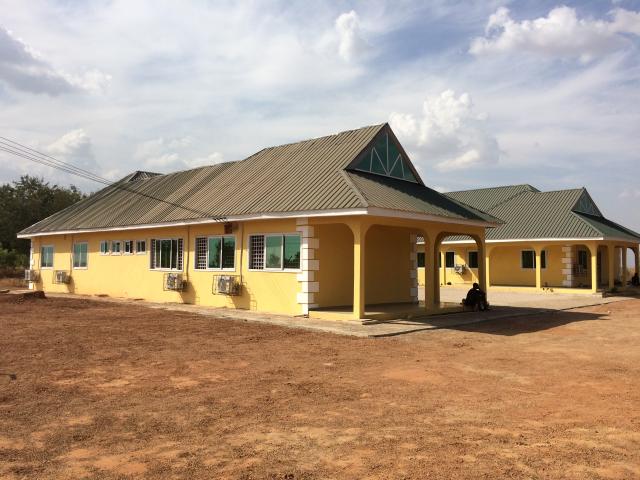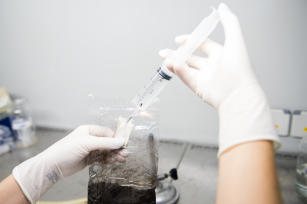Embrapa supports installation of inoculant production lab in Africa
12/12/16
|
Biological Nitrogen Fixation
Embrapa supports installation of inoculant production lab in Africa
With the aim of encouraging the use of inoculants in the cultivation of cowpeas and peanuts, traditional African crops, and increasing productivity, Embrapa helped to set up a lab to produce the input in Tamale, north of Ghana. The researcher from Embrapa Agrobiology (Seropédica, RJ) was on site for ten days to support the implementation of the facilities and also to train the team involved in local operations. Located within the Savanna Agricultural Research Institute (SARI), a research unit that belongs to the Council for Scientific and Industrial Research (CSIR), which is the agency that coordinates research activities in that country, the laboratory is the first one specifically dedicated to this purpose in all of Western Africa. "Such crops are very important as a source of protein in Western African diets, and promoting biological nitrogen fixation (BNF) in their farming is essential to ensure food security in the region", states Luis Henrique, who is also responsible for the Laboratory of Bioprocesses at Embrapa Agrobiology.
The partnership with SARI was established in a previous project coordinated by the researcher Robert Boddey, also from Embrapa Agrobiology, and involved the visit of several students from the Ghanese institute to Brazil. The visitors, at different times in the course of three months, participated in research and training activities in different areas and laboratories related to the BNF technology.
Winnefred Mensah and Deborah Gumanga, who went to the Brazilian institution in 2015, as well as Iddrish Zenab, all of whom from SARI, participated in the recently held training in Tamale. It also included the participation of the professionals Gyabaah Collins and Boday Maxwell, employees of the local company Green-EF Village, which is investing in the production of inoculants in Ghana. The construction of the building with the laboratories was financed by a project coordinated by the SARI researcher Mawuli Yevu within the scope of the Alliance for the Green Revolution in Africa (AGRA), a program that is promoted by the Gates Foundation and that stimulates research in 18 countries in that continent.
The director of Green-EF, Mohammed Sachibu, a private partner of SARI in the enterprise, commented that, for the members of his team, "the different stages of the training were very useful and essential, since they not have experience in real lab environments yet, and that it was important to help them learn notions of the production processes and of how to operate all the equipment".
The activity was held in the context of the project "High quality effective rhizobium inoculants for grain legumes in Northern Ghana", coordinated in Brazil by the researcher Luc Rouws and in Ghana by the researcher Benjamin Ahiabor, within the program Agricultural Innovation MKTplace. The success of the projects, derived from the partnership between Embrapa Agrobiology and SARI, and other institutions, is visible, since they have been promoting the expansion and furthering of research activities at an international level.
Recently, this partnership resulted in the approval of a research proposal that stemmed from and was expanded in the M-BoSs program, which comprises projects of excellency focused on the development of agricultural products that are more relevant for the African continent.
Translation: Mariana de Lima Medeiros
Liliane Bello (MTb 01766/GO)
Embrapa Agrobiology
Press inquiries
agrobiologia.imprensa@embrapa.br
Phone number: (21) 3441-1500
Further information on the topic
Citizen Attention Service (SAC)
www.embrapa.br/contact-us/sac/


